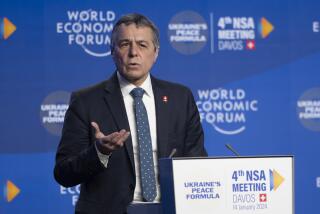Geneva Disarmament Talks Open With Focus on Chemical Weapons
- Share via
GENEVA — The 40-member U.N Disarmament Conference opened its 1989 session here Tuesday with top priority given to seeking a global ban on chemical weapons.
Secretary General Javier Perez de Cuellar sent a message to the delegates calling on them to conclude “as promptly as possible” a worldwide prohibition against chemical warfare. The current session of the conference has been given a special impetus by last month’s special meeting in Paris on controlling toxic weaponry, at which 149 nations supported a universal chemical arms ban.
In his remarks Tuesday, the senior U.S. arms negotiator, Ambassador Max L. Friedersdorf, emphasized the need to draft an effective treaty on chemical weapons.
But he said that reaching a global agreement requires patience and added that President Bush considers such a treaty a high priority in his new Administration.
Later, in an interview, Friedersdorf outlined some of the problems facing the negotiators and warned that no quick resolution is in sight. Rather, he suggested, a meaningful treaty cannot be drafted before the end of next year.
The major obstacle, he said, is the “tremendous problem” of verification--applied to both production and stockpiling of poison gas.
“Verification,” he said, “is, in this case, enormously more difficult” than that of the Intermediate-range Nuclear Forces (INF) Treaty, signed by the United States and Soviet Union in December, 1987. “And we don’t have an answer yet.”
Verification, in the U.S. view, is a scientific guarantee that a country is not breaking a treaty ban by producing or hiding poison gas weapons.
As verification procedures now exist, said Friedersdorf, “I couldn’t recommend a treaty to Congress.”
More to Read
Sign up for Essential California
The most important California stories and recommendations in your inbox every morning.
You may occasionally receive promotional content from the Los Angeles Times.













